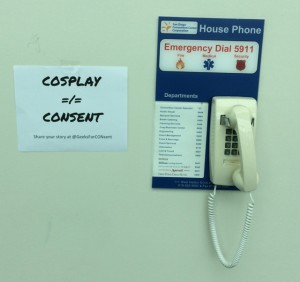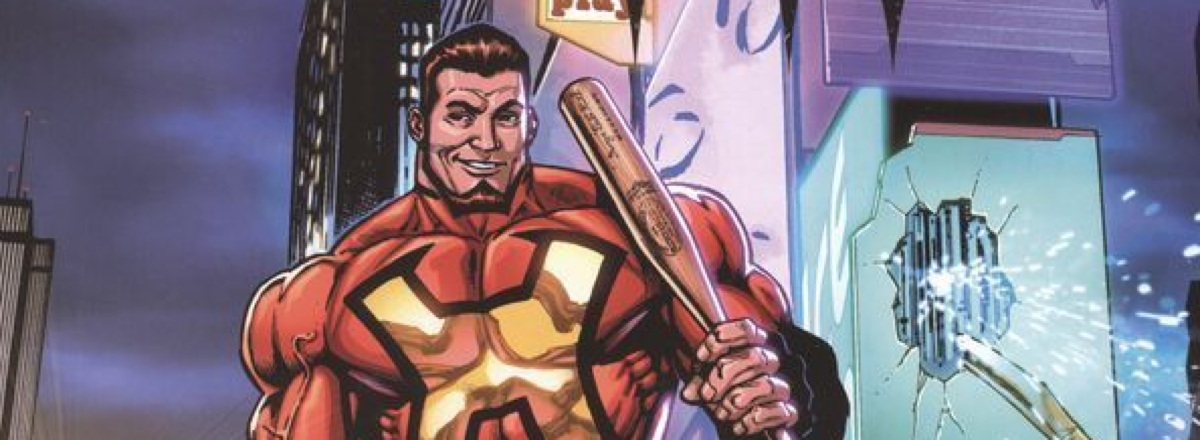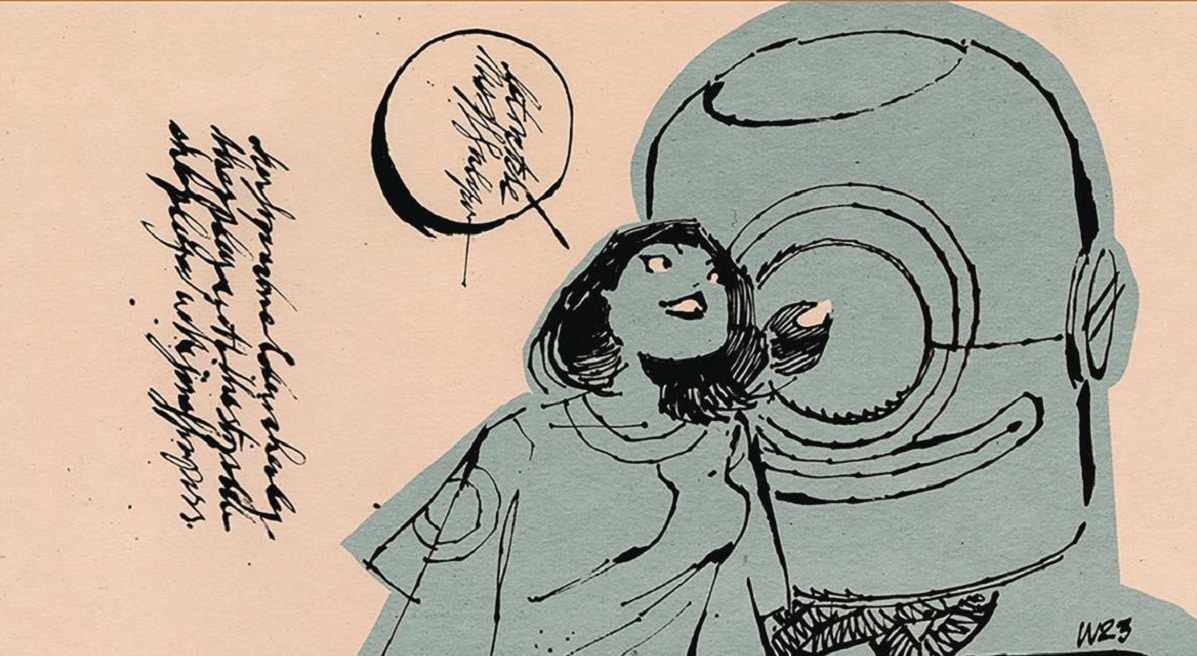
Curry’s superheroic response to the sexual attack on her friend Alicia Marie underscores the importance of taking sexual harassment at comic conventions seriously. Comic conventions have experienced exponential growth in recent years, filling not only convention venues but downtown city streets into volatile vectors for sexually inappropriate behavior. And contrary to the stereotype-ridden TMZ video, dorky fanboys are not necessarily the only culprits – downtown San Diego has become a five-day Festival, with the Red Hour striking anew each time you walk out the Convention Center doors.
How to deal with the problem of harassment within and without Comic-Con was attracting the attention of multiple media outlets even before the attack on Alicia Marie — in fact, after I scheduled this post for publication on The Beat, even Perez Hilton found the Adrianne Curry incident to be a source of moral outrage. Over the next couple posts I want to add a legal perspective, since this happens to be an area in which I have clocked a few villains of my own, albeit with words instead of a whip.
Before we do, however, I want to address a thought that may have popped into the minds of some readers, namely, the notion that women such as Currie and Alicia Marie are themselves somehow asking for it. I actually witnessed a vivid expression of this mindset when a cosplaying woman outside the Con tried to fend off a guy’s come-on by handing him a business card and promoting her own work. The guy responded by contending that there was no other way for a man to take the way she dressed than as a sign that she was looking to get laid.
This exchange stood in stark contrast to the professional discussion I’d just had with a longtime of the annual Comic-Con Masquerade, the amazing Broadway actress and theme-park entertainment designer Diane Duncan. Last Friday when we were walking through the convention chatting about cosplay she stopped to point out what she thought was a standout example of excellent craft, a woman dressed as Poison Ivy whose costume exhibited a number of characteristics that would have done well for her had she worn it for the Masquerade competition instead. The costume had a sensual vibe, yes, but that was an extension of the workmanship — whether the cosplayer’s aim in such artful attention to detail was self-expression, marketing a product, promoting her own business or a combination of all three, baiting men for sex was not the point.
As it turns out, the cosplayer was none other than Adrianne Curry, and as I read up on her and other models who cosplay I found myself in rather familiar territory. In advising on ethics and other legal matters in the fashion industry, it’s all too common to run across men who view what women wear as a sign of sexual availability, as opposed to a form of stylized expression that for many women in modeling, marketing, retail and design is an integral part of their professional identity.
The intrinsic connection between cosplay and fashion got me thinking about another connection they share: namely, unfortunate loopholes in current sexual harassment law. Although we often use the phrase “sexual harassment” when speaking of unwanted advances to cosplayers and fashion models alike, from a legal perspective the term typically refers to sexually inappropriate behavior in certain employment contexts. For example, because models are typically independent contractors, not employees, they are often not protected by sexual harassment laws, and a similar principle applies to comic convention cosplayers who are not there in the course of employment — regardless of how egregiously inappropriate the behavior may be, it technically is not a violation of sexual harassment law, nor would it fall under the purview of a typical harassment policy.
Within the fashion industry, this lacuna is being addressed primarily in two ways: through legal reform and private action. New York, for example, recently enacted a law that extends the protections in child labor laws to underage models, and efforts are ongoing to give volunteers and independent contractors new legal protections when sexually harassed. At the same time, the campaign against harassment within the industry is giving rise to new standards and practices that go beyond the limits of sexual harassment law while taking advantage of more general protections that other laws already provide.
We’re seeing a similar strategy evolve among cosplayers in regard to private action, most prominently in the work of Geeks for Consent, whose signs could be found throughout the convention center this year. I was glad to meet the group’s intrepid director, Rochelle Keyhan, briefly during Comic-Con, and have considerable regard for its efforts to call attention to this important issue. However, it’s also clear that a sharp divide persists between those calling for a more rigorous sexual harassment policy and Comic-Con itself, which has taken the position that a sufficient policy already exists. Awareness, as they say, has been raised, but the ideal provisions of a convention harassment policy remain a matter of dispute.
In my next post, we’ll take a deeper look at the Geeks for Consent campaign, the Adrianne Curry incident and existing law to see whether we can devise a new policy that will address the concerns of all sides in the ongoing debate. Meanwhile, if you have any opinions or experiences pertinent to this important discussion, please feel to leave them in the comments thread or shoot me an email at [email protected].







There never is and never will be an excuse for the actions of idiots. If you see it happen, call the guy out for it. Too often these things happen and the response from onlookers is like “dude, did you see that?”
Don’t shrug it off, point it out to the offending party that it’s not cool/tolerated/accepted in any fashion.
And take the guy’s picture! Everyone has a phone these days, take his picture and then send it out via twitter.
That girl or woman could be your daughter or your wife or your girlfriend so take this action personally.
Honestly, my first reaction would be to level the guy.
What a disgusting atitude, thrusting one´s hand down someone´s tights. Women and men should be able to enjoy themselves at comic conventions without having to worry about this type of thing happening to them.
It’s getting to the point where cosplay actors will need to hire their own security people to accompany them, to deal with the law breakers.
Maybe this non-comics media attention is what cons will need to start taking this issue more seriously across the board…
Sneaking up behind someone and thrusting your hands down his/her pants is not sexual harassment, it’s sexual assault. I’m pretty sure there are already laws against that, regardless of whether or not it happens at a comic convention. Too bad no one was able to detain the guy for the police.
I think that most guys who try to hook up with models busy working on a job are at the best ill-advised to do so. I won’t say no guy ever scores by chatting up women “on the job” but a convention floor is not a bar and it’s more often than not going to be viewed as harassment even if it’s confined to aggressive verbal flirting.
That said, this phrase stopped me:
” unwanted advances to cosplayers and fashion models alike”
Even after stating that there’s a time and place etc… how does anyone know that the advances are unwanted until AFTER they’ve been made??
I’ll have more to say on all of this next week – traveling and all that – but I want to address Gene’s point briefly. With regard to the unwanted advances, I think one of the things that female models and cosplayers alike share is a presumption that their choice of vocation/avocation means that they are DTF. This isn’t even about striking up a conversation with an eye toward starting a relationship – it’s the perception that they are sexual playthings.
For models, the equivalent of a comic convention is a photo shoot or fashion show, and the horror stories I have heard …. That’s part of why I find the reports of cosplayer harassment in our community so disappointing – it’s just so damn familiar.
The purpose of my posts is not to provide dating tips – that is definitely not my forte – but it seems to me that best thing someone could do if they are interested in a cosplayer or model would be to treat them like human beings first.
I certainly would agree that the people chatting up models and cosplayers may have this presumption.
I agree with Mark Evanier. I think harassment is both over reported and under reported. I think that low level snarky comments are under reported. I also believe that the major cases are over reported because the media love it. It gives the impression that female cosplayers are attacked all the time. And that’ not true (I hope!).
And I have chatted to the cosplayers but that’s when I’m in costume.
Am I making sense?
Comments are closed.